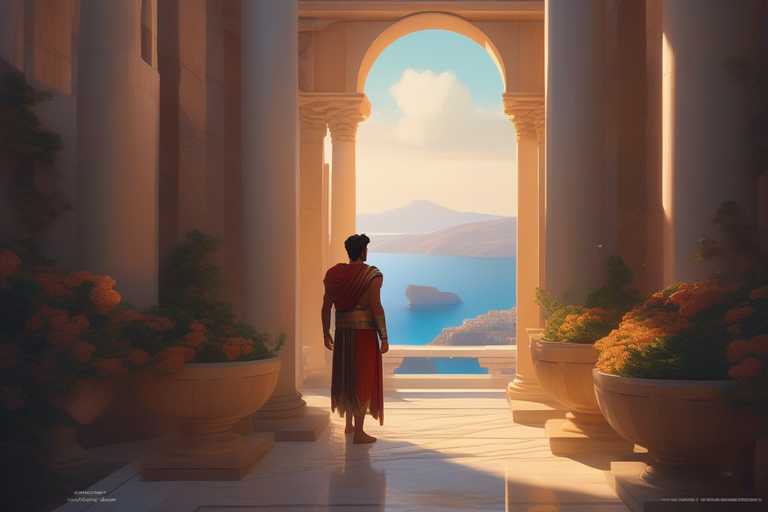Sophocles and Aeschylus

Sophocles' "Oedipus Rex" is a tragic play that tells the story of Oedipus, the King of Thebes, who unwittingly fulfills a prophecy that he would kill his father and marry his mother, leading to disaster for himself and his family. The play explores themes of fate, free will, and the search for truth, as Oedipus gradually uncovers the horrifying secrets of his past, leading to his ultimate downfall and the revelation of his tragic destiny.
Sophocles' "Oedipus Rex" is not merely a staple of ancient Greek tragedy; it is a profound exploration of the human condition, interweaving threads of spirituality, fate, and divine will. This timeless play resonates with soulful insights, offering a window into the spiritual beliefs and struggles that have captivated humanity since ancient times.
At the heart of "Oedipus Rex" lies the theme of fate. The Greeks believed in the inevitability of destiny, a path preordained by the gods.
The play invites us to reflect on our own relationship with destiny and the extent to which we are masters of our fates.
The interplay between divine will and human suffering is another spiritual dimension vividly portrayed in the play. Oedipus's plight can be seen as a manifestation of the gods' will, raising questions about the nature of the divine and its role in human afflictions. This aspect of the play echoes the spiritual notion that suffering can be a vehicle for greater understanding or enlightenment. As Oedipus grapples with his tragic revelations, his journey mirrors a spiritual awakening, albeit a painful one.
Oedipus’s relentless search for the truth, despite warnings to desist, highlights a deeply spiritual quest – the pursuit of knowledge and enlightenment. This theme resonates with the spiritual journey of seeking understanding, often in the face of uncomfortable truths. Oedipus's eventual realization and acceptance of his fate is akin to a spiritual revelation, one that brings not only suffering but also a profound sense of clarity and self-awareness.
"Sophocles' Oedipus Rex" goes beyond the realm of entertainment; it is a profound meditation on the human spirit. Its themes of fate, divine intervention, the quest for truth, hubris, and moral complexity offer timeless spiritual insights. As modern readers, we find in this ancient tragedy a mirror reflecting our own spiritual quests and dilemmas, reminding us that the echoes of the divine are as relevant now as they were in the times of Sophocles.
--

Aeschylus' "Prometheus Bound" stands as a monumental work in the canon of ancient Greek tragedy, offering not only a story of defiance and punishment but also deep spiritual insights. This play, rich in mythological lore, serves as a profound commentary on the human condition, the nature of divine power, and the quest for understanding and freedom.
The central figure of Prometheus, a titan who defies the gods by giving fire to humanity, symbolizes the human spirit's quest for knowledge and self-determination. This act of rebellion can be interpreted through a spiritual lens as a representation of the soul's desire to transcend its limitations and aspire to divine-like capabilities. Prometheus' defiance reflects a deep spiritual yearning for liberation and enlightenment, traits that have resonated with seekers and thinkers throughout the ages.
Prometheus' punishment by Zeus, bound to a rock with an eagle eternally feasting on his liver, symbolizes the steep price often paid for enlightenment and the pursuit of forbidden knowledge. This echoes a recurring spiritual theme: the journey towards greater understanding and awakening is fraught with trials and sacrifices. Prometheus' unyielding spirit in the face of suffering becomes a metaphor for the resilience of the human soul in its quest for truth.
"Prometheus Bound" also delves into the themes of fate and free will, crucial elements in spiritual discourse. Prometheus, despite his knowledge of future events, exercises his free will to challenge the status quo. This interplay between predestined events and personal choice raises profound spiritual questions about the nature of destiny and the extent of human agency in the grand tapestry of existence.
Finally, the play explores the complex relationship between humanity and the divine. Prometheus, a titan who sides with humans, represents a bridge between mortals and gods. This relationship reflects the spiritual journey of seeking connection with a higher power, understanding the divine, and reconciling the human experience with spiritual realities.
Aeschylus' "Prometheus Bound" is a treasure trove of spiritual themes and lessons. It challenges us to consider the price of knowledge, the nature of suffering, and the complexities of our relationship with the divine. As we reflect on Prometheus' story, we are invited to ponder our own spiritual journeys, the sacrifices we make for enlightenment, and our eternal quest for understanding in a world governed by forces beyond our immediate comprehension.
Aeschylus' "Prometheus Bound" is considered a Greek tragedy because it embodies the classic elements of the genre: a noble and heroic figure, Prometheus, faces immense suffering due to his defiance against the gods. This suffering, primarily his eternal punishment by Zeus, reflects the central tragic themes of hubris (excessive pride), the power of fate, and the inevitable consequences of challenging the divine order. The play's exploration of these themes against a backdrop of profound moral and existential questions aligns with the defining characteristics of Greek tragedy, emphasizing human limitations and the tragic nature of human endeavors against the divine.

Final extra:
Greek drama, a bedrock of Western literature, offers more than just tales of heroes and gods; it serves as a profound medium for exploring the depths of human experience and spiritual awakening. This exploration is especially evident in the realm of Greek tragedy, where the interplay of human frailty, divine intervention, and moral struggle often leads to a transcendent understanding of the self and the universe. Greek tragedies, with their rich tapestry of fate, suffering, and moral complexity, are not just stories of misfortune and despair. They are profound explorations of the human spirit's capacity for transcendence and enlightenment. Through the lens of these ancient dramas, we gain insight into the enduring questions of existence, the nature of suffering, and the path to spiritual awakening. As we reflect on these timeless narratives, we find that the lessons they impart are as relevant today as they were in the ancient amphitheaters of Greece.